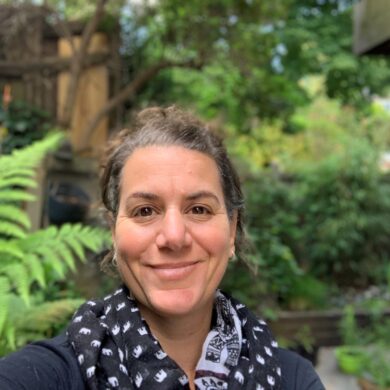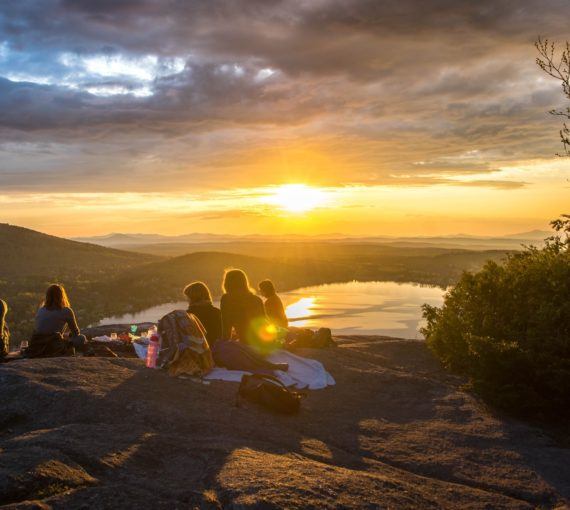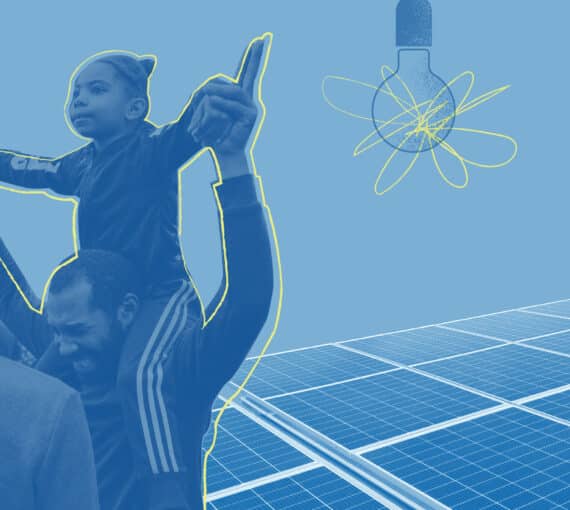
Amid political shifts and a growing climate crisis, 2025 demands sustained and urgent action. While challenges mount, solutions like renewable energy and shared values offer hope. Discover how we can drive meaningful change this year. (Photo: Kelly Sikkema via Unsplash)
The year is off to a turbulent start with political uncertainty gripping Canada. Prime Minister Justin Trudeau has announced he’s resigning, the Liberal Party will elect a new leader on March 9, we’re facing tariff threats from the incoming president of our biggest trading partner and Parliament has been prorogued until March 24 — which happens to be David Suzuki’s 89th birthday. A federal election will follow soon after. Meanwhile, the extreme fires devastating the Los Angeles area remind us that the climate crisis won’t wait. Neither will the affordability crisis. These challenges continue to escalate and demand urgent action regardless of political maneuvering.
There’s no denying the enormity of the challenges we face. Extreme weather events are becoming more frequent and damaging around the world, including Canada. Disinformation continues to be spread by the people benefiting from the status quo, and it’s eroding trust and polarizing people who desperately need unity. People are scared, and fear deepens political divisions. It’s easy to feel disheartened when the world feels so broken.
But here’s the paradox: Just as the impacts of climate change are accelerating faster than expected, so too are the solutions. This gives me hope — reluctant, cautious hope, but hope nonetheless.
Decoupling climate action and politics
The climate crisis is many things — urgent, existential and multifaceted — but one thing it should never be is partisan. While different political parties and leadership candidates treat the issue with varying levels of seriousness and competence, climate change itself doesn’t care about political ideologies or electoral cycles. Extreme weather doesn’t pause to check polling numbers. Rising sea levels don’t ask which side of the aisle you sit on. And so, as advocates for climate justice, neither will we.
Finding hope in the rapid growth of solutions
Renewable energy adoption is surging at a pace few anticipated. Solar and wind energy are not only cleaner but also more cost-effective than fossil fuels, rapidly becoming the most sensible economic choice. This shift won’t just save the climate; it will save people money, help us become more energy-independent and secure, create jobs and build resilience. Provinces, territories and Indigenous Peoples in Canada made big progress in expanding renewables in 2024, recognizing that clean electricity is a substantial economic opportunity.
Cultivating hope by finding common ground
We’re not as divided in Canada as some of our politicians would have us believe. Although there’s always disagreement, healthy or not, we have a lot in common. We all want clean air and water, affordable food and a safe place to call home. The vast majority want to protect nature and accelerate the transition to renewable energy. These shared values are the foundation upon which we can build bridges.
By learning to have respectful conversations and approach disagreement with curiosity, we can almost always find areas of common ground that allow for much needed progress, civility, understanding and hope.
Finding hope in civic and scientific literacy to counter disinformation
We’re all on more solid ground when we can decipher what’s true and what isn’t. There is so much disinformation infiltrating the discourse about these important issues. The confusion can lead to disengagement, distrust, fear and inaction. Disinformation from politicians is especially toxic since they were elected to govern in the public’s interest. The David Suzuki Foundation is working on building civic, political and scientific literacy within our community of supporters to help inoculate us against the dangers of these lies. We’re particularly focusing on exposing and debunking disinformation about fossil fuels and their role in the climate crisis.
What do we do now?
Living in a world so full of uncertainty can be overwhelming. But the path forward is not a mystery. It’s the same path we’ve always walked — the path of community, action and resilience.
- Build community: Isolation breeds despair. Connecting with others not only strengthens our resolve but also creates networks of support and action. Please follow us on social media and join our email list to stay connected and hear about webinars, events and opportunities for collective action.
- Engage politically: Volunteer for candidates or political organizations that align with your values, or run for office yourself. The fight for climate justice needs as many climate champions in Parliament, and all levels of government, as possible. Note: As a charitable organization, the Foundation must remain non-partisan, especially during election campaigns.
- Have conversations: Talk to your neighbours, colleagues, family and friends. Have open and empathetic conversations and seek to understand others’ perspectives, even when you disagree. Civil dialogue is the bedrock of progress. Find out more about how and why to have climate change conversations.
- Counter disinformation: Build your civic and scientific literacy and call out the lies when you see them. Find out about Big Oil’s deceit at Fossil Fuel Exposed.
- Celebrate the wins and mourn the losses: Grieve the losses — of ecosystems, of homes, of lives. But don’t forget to celebrate the wins, no matter how small. They remind us that progress is possible.
- Take action: Make sure to let all parties know that we want whoever forms the next government to prioritize people and the planet over polluters’ profits.
Making progress in 2025
The challenges of 2025 are immense and will test us in ways we can’t yet imagine. But we’ve faced great challenges before, and we’ve risen to meet them. Historian Rutger Bregman — who believes that climate change is the greatest challenge of our time and that time is running out — also reminds us of humankind’s resilience and warns of letting our “fear and cynicism become a self-fulfilling prophecy that paralyzes us with despair while temperatures climb unabated.”
This year, let’s focus on what unites us and what we’re fighting for: peace, justice, safety, equity, health, affordability and a healthy environment for all to thrive in.
Hold the oil and gas sector accountable for its role in the climate crisis
Related projects
Always grounded in sound evidence, the David Suzuki Foundation empowers people to take action in their communities on the environmental challenges we collectively face.


